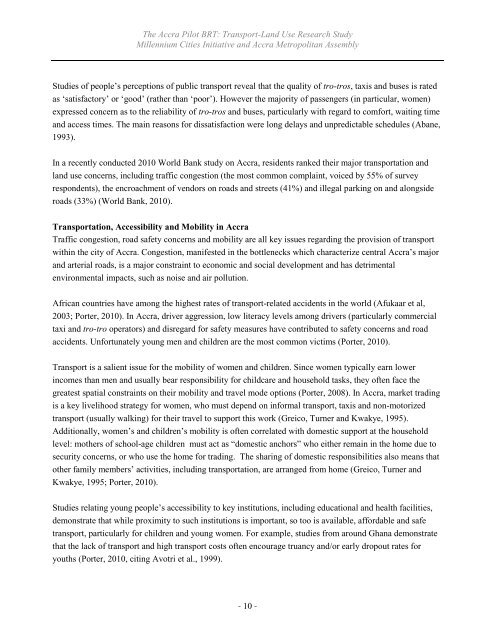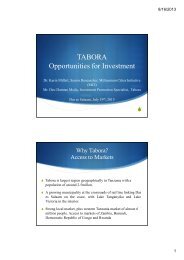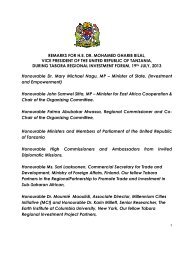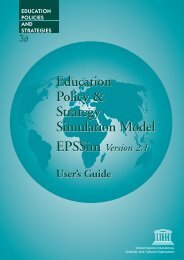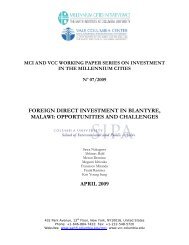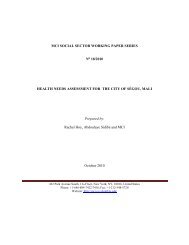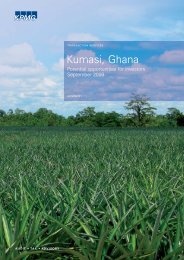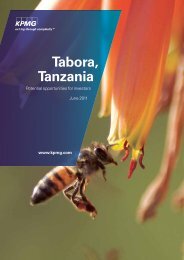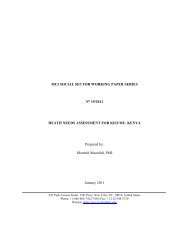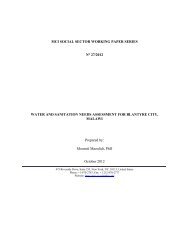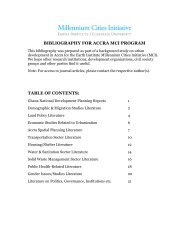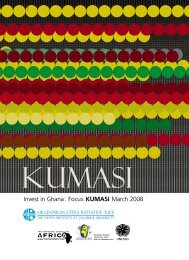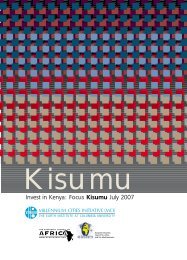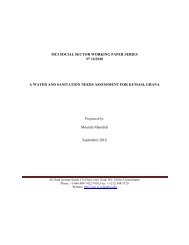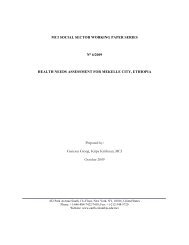Transport-Land Use Research Study - Millennium Cities Initiative ...
Transport-Land Use Research Study - Millennium Cities Initiative ...
Transport-Land Use Research Study - Millennium Cities Initiative ...
Create successful ePaper yourself
Turn your PDF publications into a flip-book with our unique Google optimized e-Paper software.
The Accra Pilot BRT: <strong>Transport</strong>-<strong>Land</strong> <strong>Use</strong> <strong>Research</strong> <strong>Study</strong><br />
<strong>Millennium</strong> <strong>Cities</strong> <strong>Initiative</strong> and Accra Metropolitan Assembly<br />
Studies of people‟s perceptions of public transport reveal that the quality of tro-tros, taxis and buses is rated<br />
as „satisfactory‟ or „good‟ (rather than „poor‟). However the majority of passengers (in particular, women)<br />
expressed concern as to the reliability of tro-tros and buses, particularly with regard to comfort, waiting time<br />
and access times. The main reasons for dissatisfaction were long delays and unpredictable schedules (Abane,<br />
1993).<br />
In a recently conducted 2010 World Bank study on Accra, residents ranked their major transportation and<br />
land use concerns, including traffic congestion (the most common complaint, voiced by 55% of survey<br />
respondents), the encroachment of vendors on roads and streets (41%) and illegal parking on and alongside<br />
roads (33%) (World Bank, 2010).<br />
<strong>Transport</strong>ation, Accessibility and Mobility in Accra<br />
Traffic congestion, road safety concerns and mobility are all key issues regarding the provision of transport<br />
within the city of Accra. Congestion, manifested in the bottlenecks which characterize central Accra‟s major<br />
and arterial roads, is a major constraint to economic and social development and has detrimental<br />
environmental impacts, such as noise and air pollution.<br />
African countries have among the highest rates of transport-related accidents in the world (Afukaar et al,<br />
2003; Porter, 2010). In Accra, driver aggression, low literacy levels among drivers (particularly commercial<br />
taxi and tro-tro operators) and disregard for safety measures have contributed to safety concerns and road<br />
accidents. Unfortunately young men and children are the most common victims (Porter, 2010).<br />
<strong>Transport</strong> is a salient issue for the mobility of women and children. Since women typically earn lower<br />
incomes than men and usually bear responsibility for childcare and household tasks, they often face the<br />
greatest spatial constraints on their mobility and travel mode options (Porter, 2008). In Accra, market trading<br />
is a key livelihood strategy for women, who must depend on informal transport, taxis and non-motorized<br />
transport (usually walking) for their travel to support this work (Greico, Turner and Kwakye, 1995).<br />
Additionally, women‟s and children‟s mobility is often correlated with domestic support at the household<br />
level: mothers of school-age children must act as “domestic anchors” who either remain in the home due to<br />
security concerns, or who use the home for trading. The sharing of domestic responsibilities also means that<br />
other family members‟ activities, including transportation, are arranged from home (Greico, Turner and<br />
Kwakye, 1995; Porter, 2010).<br />
Studies relating young people‟s accessibility to key institutions, including educational and health facilities,<br />
demonstrate that while proximity to such institutions is important, so too is available, affordable and safe<br />
transport, particularly for children and young women. For example, studies from around Ghana demonstrate<br />
that the lack of transport and high transport costs often encourage truancy and/or early dropout rates for<br />
youths (Porter, 2010, citing Avotri et al., 1999).<br />
- 10 -


